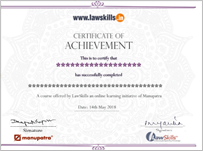Have general questions about LawSkills? You can find helpful information on LawSkills in our FAQ section.
Have a question about something specific? Contact LawSkills’ General Support Team directly for a quick and efficient response:
Please note: The LawSkills Support Team will address your queries in English. While we will do our best to address your enquiry in any language, our responses will be in English.
| Serial No. | Course Name | Text |
|---|---|---|
| 1 | General | Launch of LawSkills on 28th June 2017 |
Judgments interpret the law and, sometimes, even make laws. Thus, there is perhaps nothing more important for law students, lawyers and judges than to have the ability to closely and critically read judgments – often, many of them in a very short time. Reading case summaries and notes does not suffice in acquainting them with the applicable law; it merely tells them the holding in a particular case. Thus, judgment reading has no substitute.
This course apprises you with ways to read, understand, interpret and use caselaws/judgments in the most efficient and targeted manner. It acquaints you with smart and productive ways to read judgments, thus helping you cut down on the number of long, tedious hours wasted in deciphering lengthy texts. Further, the course explains how to identify judgments through their citations and where to find these judgments in law reporters, online databases, etc.
After completing this course, you will be able to:


Level: Beginners
Language : English
Duration: 6 Months
EVALUATION METHOD
Progress will be tested by way of quizzes and assignments at the end of each Module. Learners must attempt the exam at the end of the course and secure at least 50% marks to obtain course certificate.
Lawskills.in is now manupatracademy.com
For any queries write to us at academy@manupatra.com
This course page is for informational purposes only. We are **no longer accepting new registrations on this website.**
Please click the button below to be redirected to our new, official enrollment platform:
Go to New Registration Site| S.No. | Title | Date | File | Edit | Delete |
|---|


